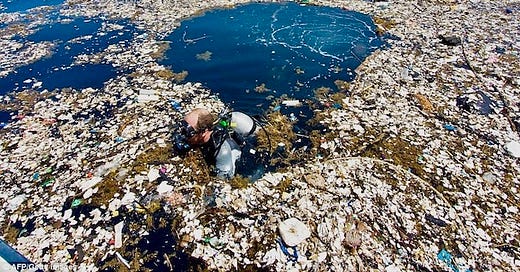Plastic Planet = Plastic People
I’ve done many articles on plastic pollution — including some of the first ones on microplastics in the oceans and in the remotest parts of our increasingly plastic planet. Plastic is up there with climate change in term of its threats to the health and well being of our home and you and I. (The same petrochemical companies are behind both.)
Here are some brief need-to-knows:
Need-to-Know 1: Plastic is just a form of fossil fuel.
Your plastic water bottle, your grocery bag, your foam tray full of cucumbers ... they're all made from oil or natural gas. It takes lots of energy to make that happen.
Need-to-Know 2: If the plastics industry was a country it would be the 4th largest carbon polluter, after China, the US, and India.
Need-to-Know 3: Global demand for plastics is expected to increase by some 22% over the next five years.
Need-to-Know 4: Just 9% of plastic has ever been recycled a 2017 study shows.
Recycling plastic is expensive compared to making virgin plastic. The plastics industry might be the world’s most wasteful industry.
Need-to-Know 5: Nearly every piece of plastic ever made still exists in some form today.
Fish have been swallowing microplastics since the 1950s and the concentration of microplastics in their guts has increased over time new research shows. There were no plastic particles in fish gullets before mid-century according to researchers at Chicago’s Field Museum where they have some two million fish specimens dating back to 1900.
Need-to-Know 6: 15 million tons of plastics enter the ocean every year according to the latest estimate.
Need-to-Know 7: Rich countries export the majority of their plastic waste to poorer countries.
The US ships most of its plastic waste to Malaysia since China no longer takes it. Customs officials in Senegal recently seized a container with 25 tons of plastic waste from Germany.
Need-to-Know 8: Single-use plastics account for over a third of plastics produced every year.
Just 20 petrochemical companies led by ExxonMobil, Dow and China’s Sinopec produce over 50 per cent of all single-use plastic a new report reveals. Leading banks like Barclays, HSBC and Bank of America provide the funding.
Need-to-Know 9: Lower oil prices in recent years has made plastic production more profitable.
With the shift to renewable energy and electric vehicles, the oil industry is now pivoting to plastics and investing $ billions to increase production.
Plastic Planet = Plastic People
That’s probably more than you wanted to know but bear with me for one more. Plastic pollution isn’t just ugly, it’s dangerous. Plastics, microplastics, and nanoplastics have been in found inside nearly every living thing including plants and the placentas of unborn babies.
Yes, you and I are now partially, and unwillingly, made of plastic.
How dangerous is this for us? No one knows. There’s lots of research ongoing: One medical researcher spoke of her prelimanary results about effects of microplastic particles on human immune system :
“…provokes an inflammatory response within the body, one wherein the immune system makes and directs more immune cells towards microplastics”
Need-to-Know 10: Plastic particles are now found inside nearly every living thing including the unborn.
Here’s some good news
There is some progress in dealing with plastics.
Across Africa, 34 countries have banned or taxed single-use plastics, according to the United Nations. China and India plan to phase them out by 2022. Canada has set a target of zero-plastic waste by 2030 and plastic is now considered toxic under Canada’s primary environmental law. A coalition of oil and chemical companies including Imperial Oil Ltd., Dow Chemical Canada and Nova Chemicals Corporation have sued the Canadian government over this.
Australia’s Minderoo Foundation is launching an intriguing scheme to get plastic manufacturers to pay a voluntary financial contribution for every ton of new plastic they make. For example a virgin plastic tariff of US $200 per tonne and, for the most difficult to recycle plastics, could be up to US $5,000 per tonne. By increasing the cost of virgin plastic it should greatly increase the collection and use of recycled plastics.
The Foundation is committing US$300 million to set the whole thing up.
What you can do about plastic pollution?
Aim for a zero waste lifestyle. Impossible? Maybe but I’ve interviewed a young millennial who downsized her yearly trash pile so it literally fits inside an eight-ounce jar. And also a suburban family who put out only one bag trash a year. They provided some very helpful tips in this Nat Geo article I wrote.
Five Principles of Zero-waste From the Experts*
1. Refuse - refuse to buy things with lots of packaging
2. Reduce - donʼt buy things you donʼt really need
3. Reuse - repurpose worn out items, shop for used goods, and purchase reusable products like steel water bottles
4. Compost - up to 80 percent of waste by weight is organic. But this rarely decomposes in landfills
5. Recycle – It still takes some energy and resources to recycle, but itʼs better than sending stuff to the landfill or allowing it to become litter
*These are listed in order of importance
Until next time, stay safe
Stephen




